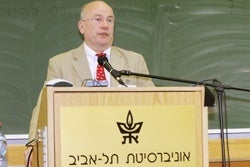August 22, 2012 — Attendees at the first Israeli Conference on Tobacco or Health earlier this summer hoped to “make tobacco history” in the country, and they appear to have political will behind this goal. With the help of Harvard School of Public Health’s Gregory N. Connolly and his colleagues at the Center for Global Tobacco Control, a comprehensive reform package including advertising restrictions, price increases, and cessation aid was passed into law last year. Public opinion polling now shows support for restrictions on smoking in public places and the Ministry of Health’s Director General Ronni Gamzu has vowed to continue the fight to denormalize tobacco use. In an impassioned speech at the conference, Gamzu promised that he would make tobacco control central to the Ministry’s public health plans.
“The conference allowed the Israeli tobacco control movement and the School to bring convincing scientific evidence to the nation’s public, media, and policy makers that tobacco has no long term economic or health benefit,” said Connolly, professor of the practice of public health and director of Center for Global Tobacco Control. Organizers hope that the conference will help spur efforts to further reduce smoking rates in Israel. The country’s adult smoking rate currently is 28 percent for men, 16 percent for women, down from 43 and 30 percent respectively in 1972. Twenty-two percent of all Israeli deaths are related to smoking.
Leah Rosen, chair of the Department of Health Promotion at Tel Aviv University’s School of Public Health worked with HSPH to organize the June 13, 2012 conference, which was attended by researchers and representatives from nongovernmental organizations and the Israeli government. She presented results from a survey which found that the public is much more supportive of reducing secondhand smoke than policymakers believed. The majority of Israelis, including many current and former smokers, favored smoking bans outside medical facilities (93%), in vehicles carrying children (94%), and even in bars and pubs (67%).
Connolly has been among those leading the charge for worldwide tobacco control at the grassroots and government levels for more than two decades. He has consulted with tobacco control advocates in Israel for the past six years, and he worked closely last year with Israeli legislators to design and pass the country’s National Tobacco Control Plan. The law included for the first time restrictions on smoking in outdoor areas including railway platforms, hospital entrances, and restaurant patios. He and his colleagues plan to continue working with Israel’s Ministry of Health and other government allies as they work to enforce the new law and introduce new programs such as a youth anti-smoking initiative.
The Center for Global Tobacco Control currently focuses on reducing smoking prevalence in areas where rates are particularly high, including China and countries in the Middle East and Mediterranean region, with other research projects ranging from the health effects of children’s exposure to second-hand smoke to the consumer response to tobacco products and messaging.
—Amy Roeder
Learn more
HSPH’s Connolly Fighting Tobacco Use Worldwide (HSPH News)
Smoke-free Air Laws Effective at Protecting Children from Secondhand Smoke (HSPH press release)
Making Smoking History Worldwide (Harvard Public Health)
